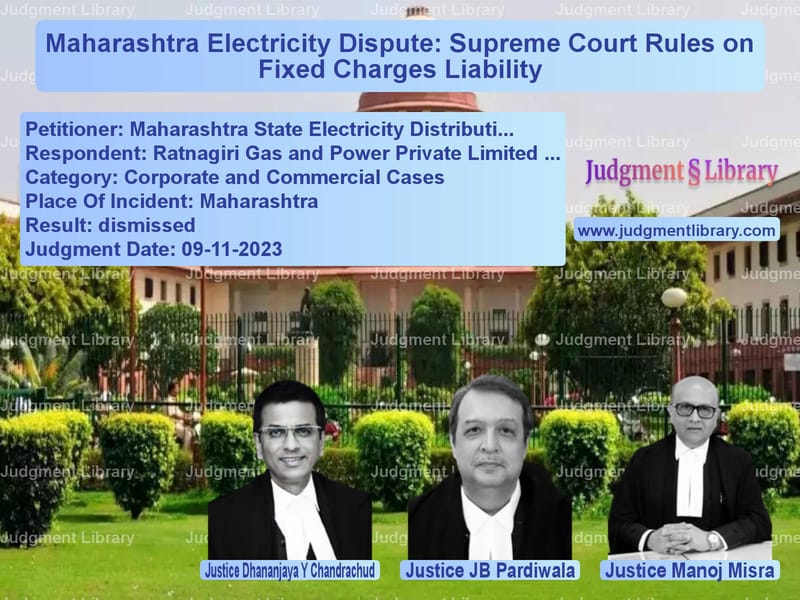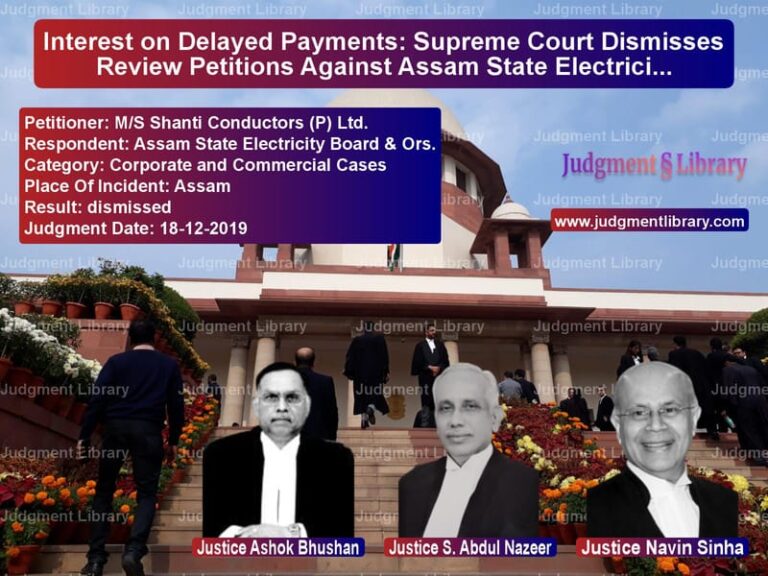Maharashtra Electricity Dispute: Supreme Court Rules on Fixed Charges Liability
The Supreme Court of India recently adjudicated on a significant dispute between Maharashtra State Electricity Distribution Company Limited (MSEDCL) and Ratnagiri Gas and Power Private Limited (RGPPL), a power transmission company. The case revolved around the issue of fixed capacity charges under a long-term Power Purchase Agreement (PPA) and the role of alternative fuel sources in meeting power obligations.
The judgment, which involved the interpretation of key contractual clauses and the implications of energy procurement changes, has set an important precedent for electricity distribution and procurement agreements in India.
Background of the Case
The dispute originated when RGPPL, which owns a gas-based generating station in Ratnagiri, Maharashtra, faced a shortfall in domestic gas supply due to declining yields from the KG-D6 gas fields. To maintain its power generation, RGPPL entered into a Gas Supply Agreement (GSA) with Gas Authority of India Ltd. (GAIL) to procure Recycled Liquid Natural Gas (RLNG). However, MSEDCL, the primary buyer of electricity under the PPA, refused to schedule power generated using RLNG, arguing that RGPPL had not obtained prior approval for the alternative fuel arrangement.
Read also: https://judgmentlibrary.com/supreme-court-holds-nclat-members-in-contempt-for-ignoring-its-order/
This dispute led to a legal battle before the Central Electricity Regulatory Commission (CERC) and later the Appellate Tribunal for Electricity (APTEL), both of which ruled in favor of RGPPL, directing MSEDCL to pay the fixed capacity charges despite its refusal to procure power generated using RLNG.
Arguments by the Petitioner (MSEDCL)
The petitioner, Maharashtra State Electricity Distribution Company Limited, contended that:
- The Power Purchase Agreement (PPA) required RGPPL to obtain MSEDCL’s prior approval before changing the fuel source from domestic natural gas to RLNG.
- Clause 5.9 of the PPA specifically stated that any commercial implications, such as changes in plant availability or pricing, required a supplementary agreement with MSEDCL.
- The obligation to pay fixed charges was contingent on the availability of power using the originally agreed-upon fuel source, and the shift to RLNG without prior approval effectively absolved MSEDCL of this liability.
- The lower authorities (CERC and APTEL) misinterpreted the contractual provisions by separating capacity charges from energy charges, when in reality, both were subject to the same approval requirement.
- The decision to hold MSEDCL liable for fixed charges would unfairly impact consumers, as the additional cost burden would ultimately be passed on to end users.
Arguments by the Respondent (RGPPL)
Ratnagiri Gas and Power Private Limited, the respondent, countered these claims by arguing that:
- The PPA explicitly recognized RLNG as a primary fuel, along with natural gas, under Clause 4.3. Since RLNG was a permitted fuel, there was no requirement to obtain MSEDCL’s approval before declaring capacity based on RLNG.
- Clause 5.9 of the PPA applied only to arrangements involving liquid fuels, which were distinct from RLNG. Therefore, the approval requirement cited by MSEDCL was irrelevant in this case.
- Even if MSEDCL chose not to procure power generated using RLNG, it was still liable to pay fixed charges under Clause 5.2, which mandated payment based on declared capacity rather than actual power procurement.
- The fixed charges were essential for maintaining the financial viability of the project, which was established after the failure of the Dabhol Power Company.
- MSEDCL’s refusal to schedule power was a commercial decision and did not exempt it from its obligations under the PPA.
Supreme Court’s Key Observations
The Supreme Court carefully examined the contractual provisions and the factual background of the case. The Court made several key observations:
- Clause 4.3 of the PPA clearly listed RLNG as a primary fuel, meaning that its use did not require MSEDCL’s prior approval.
- Clause 5.9, which stipulated approval requirements for fuel contracts, specifically applied to liquid fuels, not RLNG. The Court found that the lower authorities had correctly separated the obligations related to fixed charges and energy procurement.
- The fixed charges under Clause 5.2 were linked to declared capacity, not actual energy procurement. This meant that MSEDCL’s refusal to purchase power did not absolve it of its obligation to pay the agreed-upon fixed charges.
- The shortage of domestic gas was a nationwide issue beyond RGPPL’s control, and its decision to procure RLNG was necessary to maintain plant availability.
- Interpreting the contract in a manner that required MSEDCL’s approval for RLNG procurement would undermine the viability of the power project and go against the fundamental principles of contract law.
Key Excerpt from the Judgment
In rejecting MSEDCL’s argument that its liability was contingent on fuel approval, the Supreme Court stated:
“The requirement of an agreement, mandated for an arrangement involving liquid fuel, cannot be read into the plain text of Clause 4.3, which explicitly permits RLNG as a primary fuel. Thus, the capacity declaration based on RLNG could be done unilaterally, unencumbered by the requirement of the appellant’s consent in Clause 5.9 of the PPA.”
The Court further emphasized that allowing MSEDCL to avoid payment obligations based on fuel source objections would create uncertainty in long-term power procurement agreements.
Final Judgment and Directions
Based on these findings, the Supreme Court ruled as follows:
- The appeal by MSEDCL was dismissed, and the orders of CERC and APTEL were upheld.
- MSEDCL was directed to pay the fixed charges as per the PPA, irrespective of its refusal to procure power generated using RLNG.
- The execution proceedings initiated by RGPPL to recover outstanding charges were permitted to continue.
- The Court clarified that contractual obligations in power agreements must be interpreted based on clear textual provisions and not inferred approval requirements.
The ruling reinforces the sanctity of long-term power agreements and highlights the importance of clear contractual interpretation in electricity procurement disputes.
Petitioner Name: Maharashtra State Electricity Distribution Company Limited.Respondent Name: Ratnagiri Gas and Power Private Limited & Ors..Judgment By: Justice Dhananjaya Y Chandrachud, Justice JB Pardiwala, Justice Manoj Misra.Place Of Incident: Maharashtra.Judgment Date: 09-11-2023.
Don’t miss out on the full details! Download the complete judgment in PDF format below and gain valuable insights instantly!
Download Judgment: maharashtra-state-el-vs-ratnagiri-gas-and-po-supreme-court-of-india-judgment-dated-09-11-2023.pdf
Directly Download Judgment: Directly download this Judgment
See all petitions in Company Law
See all petitions in Corporate Compliance
See all petitions in unfair trade practices
See all petitions in Contract Disputes
See all petitions in Judgment by Dhananjaya Y Chandrachud
See all petitions in Judgment by J.B. Pardiwala
See all petitions in Judgment by Manoj Misra
See all petitions in dismissed
See all petitions in supreme court of India judgments November 2023
See all petitions in 2023 judgments
See all posts in Corporate and Commercial Cases Category
See all allowed petitions in Corporate and Commercial Cases Category
See all Dismissed petitions in Corporate and Commercial Cases Category
See all partially allowed petitions in Corporate and Commercial Cases Category







